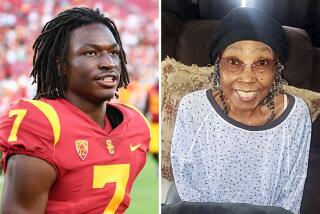Donating Life
- Share via
It’s one of those tragic stories that slide through the consciousness of anyone who didn’t know the victim: Matt Colby, 17, a carefree senior who wore Mickey Mouse socks while playing defensive end for the Costa Mesa Mustangs, collapses and dies on the sidelines. A young life ends way too soon. We’ve witnessed way too many of those recently.
But hidden behind the oft-told tale of shattered family, grieving teammates and stunned fans is a rarely told story of courage, generosity and the warmth of giving that helps to heal. Matt’s mother, Kelli, donated his organs and tissues.
With that simple, brave decision by a mom in shock, the lives of more than a dozen Americans were saved or improved. One of Matt’s kidneys went to a 39-year-old Arizona resident, the other to a 16-year-old Angeleno. Matt’s liver was split, now residing in the bodies and lives of two Los Angeles residents--a 51-year-old and a 4-year-old. The pancreas went to a 28-year-old Inland Empire resident. Matt’s heart valves, some skin and some bones went elsewhere, while his corneas restored two individuals’ sight.
Because our society too easily recoils from superficially gruesome talk of organ and tissue recoveries, we also needlessly deny ourselves the hope and progress that organ donations bring. Doctors and grieving families describe the unexpected solace of bestowing renewed life on others from a loved one’s premature death. Southern California is notorious for lagging in donations, in part because of its diversity of religions and cultures, some with grieving rituals that effectively prohibit organ recovery.
Thanks to OneLegacy, the region’s federally designated organ procurement group [(800) 786-4077], and its expanding community education programs, organ donations have increased. Not every willing donor is accepted, but OneLegacy predicts that donated organs will rise from 834 in 1999 to about 1,000 this year from 330 people, including Matt Colby.
Continuing organ donation education is essential. Studies show, for instance, more than half of second-generation Asian immigrants willing to sign organ donor cards, while fewer than 10% of their parents are. But even a donor card signed at the Department of Motor Vehicles is wasted unless carried by a potential donor and found after, say, an accident.
State Sen. Jackie Speier’s bill SB 108, now on Gov. Gray Davis’ desk, creates a computerized statewide organ registry for instant checking. Fourteen other states have one. It’s an excellent idea and cheap, even if the seemingly inflated $1.2-million setup estimate proves accurate. Davis can soothe many losses and save countless lives with the stroke of a pen. He should donate his signature.
More to Read
Sign up for Essential California
The most important California stories and recommendations in your inbox every morning.
You may occasionally receive promotional content from the Los Angeles Times.









